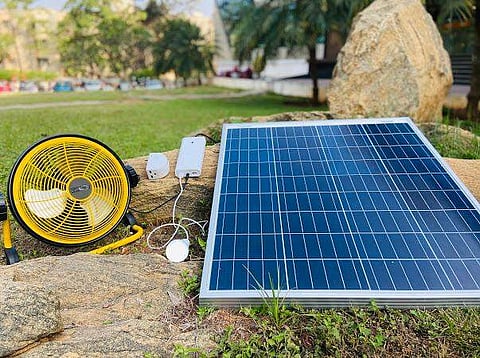

Last week, when Bengaluru girl Prerna Wadikar was awarded the Vice-Chancellor's Social Impact Award by the University of Oxford, the news spread on social media. She was recognised for making portable energy access more affordable by developing a model using a lithium-ion battery. She says, "The objective of this innovation is to make energy both accessible and, more importantly, affordable to the end users. We are confident that when manufactured at scale, this will be one of the lowest priced solar chargeable product in its category internationally. To make it accessible to all, we will need both corporate and government support."
This award was conceptualised in 2010 by the former Vice-Chancellor of Oxford, Prof Andrew Hamilton. It is presented every year to Oxford University students who show exceptional achievement and commitment to positive social change. "I was given this award for starting Jeeva Global, creating the Oxford India Business Conclave, supporting immigrant communities in Oxfordshire and a decade-long demonstration of social development through my personal and professional initiatives,"she says.
Prerna has rich multi-sectoral experience working with some of the most influential global thought leaders at multinationals, government and social enterprises in six countries and 25 states in India. She explains. "My portfolio career spans across energy management, technology, health and nutrition, skill development, circular economy, and growth of small and medium enterprises. Academically, I am a Computer Engineer with a Postgraduate in Public Policy from IIM, Bangalore and an MBA from University of Oxford with 100% scholarship from the Weidenfeld-Hoffmann Trust."
Excerpts from an interesting chat:
1. What interested you in Science?
My paternal grandmother did her postgraduation after her fifth child, worked as a high school teacher and also ran a part-time free school in her house to help underprivileged children in the locality. This made a difference to me because in her time, women barely went to school, let alone complete a master's degree and teach. I am born to a family that celebrates and believes that education is a privilege. I remember my mother, who is a yoga therapist and double postgraduate herself, telling me that science should be used for the betterment of society.
2. Was there are incident that sparked the idea of creating an affordable and accessible energy model?
I went on multiple shodhyatras with Prof Anil Gupta from IIM Bangalore which introduced me to the vibrancy and richness of Bharat. It was a transformational experience. He has been the prime driver to instill in me the need to recognise and appreciate latent talent in our country and to innovate for people at the base of the economic pyramid. During the first lockdown, pushcart vendors were affected severely. Although the government announced the 5000 Crore SVANiDHI scheme to help pushcart vendors, people are hesitant to buy from them even now. This inspired the business model to supplement the income of pushcart vendors through additional revenue sources and facilitate increased earning potential.
Employees of the knowledge economy have conveniently reset their work environment from office to their houses and even exotic locations like beach resorts. However, this luxury cannot be extended to the labour markets whose survival depends on daily wages through physical work and have no alternate means of livelihood. I was in touch with Livaah innovations Pvt Ltd, an electronic system design and manufacturing company based out of Bengaluru, from a prior engagement. I connected with them to explore the feasibility of addressing the energy need of micro entrepreneurs through purpose-designed green technology. Dr Sathya — internationally reputed for his pioneering innovations in lithium-ion technology — and Bharat Rao — a leader in green infrastructure development in India — helped convert the specifications into prototypes for pilot deployments of a solar chargeable lithium-ion portable battery for pushcart vendors.
3. From being a computer sciencist to a public policy graduate to the creator of an accessible and affordable portable energy model — you must tell us what the journey has been like.
Enterprise development is a core part of the Weidenfeld-Hoffmann leadership development programme of which I am one of the 30 university-wide selected recipients. My motivation to work for the larger social good, my experience in energy management during my stint with Schneider Electric and the support of Livaah Innovations that led to the creation of Jeeva Global. This initiative has been a consolidation of my diverse academic and professional experiences.
4. How does the portable energy model work?
Jeeva is a versatile and portable power solution with a flexible end-use. It can be fast charged in just one hour compared to 5 hours for other batteries and can run up to three devices simultaneously. Any place that needs energy access and use of multiple electric devices will find Jeeva of immense help. Some of the many uses could be powering the refrigeration of vaccines at primary health centres, running lights and small table fans in small shops, powering residences in tribal and remote areas. The best thing about Jeeva is that it can be completely independent of electric grid through its capability to charge through solar panels. This model was used in a pilot project in Bengaluru and the feedback from pushcart vendors has been positive. The product should be available commercially once we develop a dedicated production line at Livaah Innovations.
